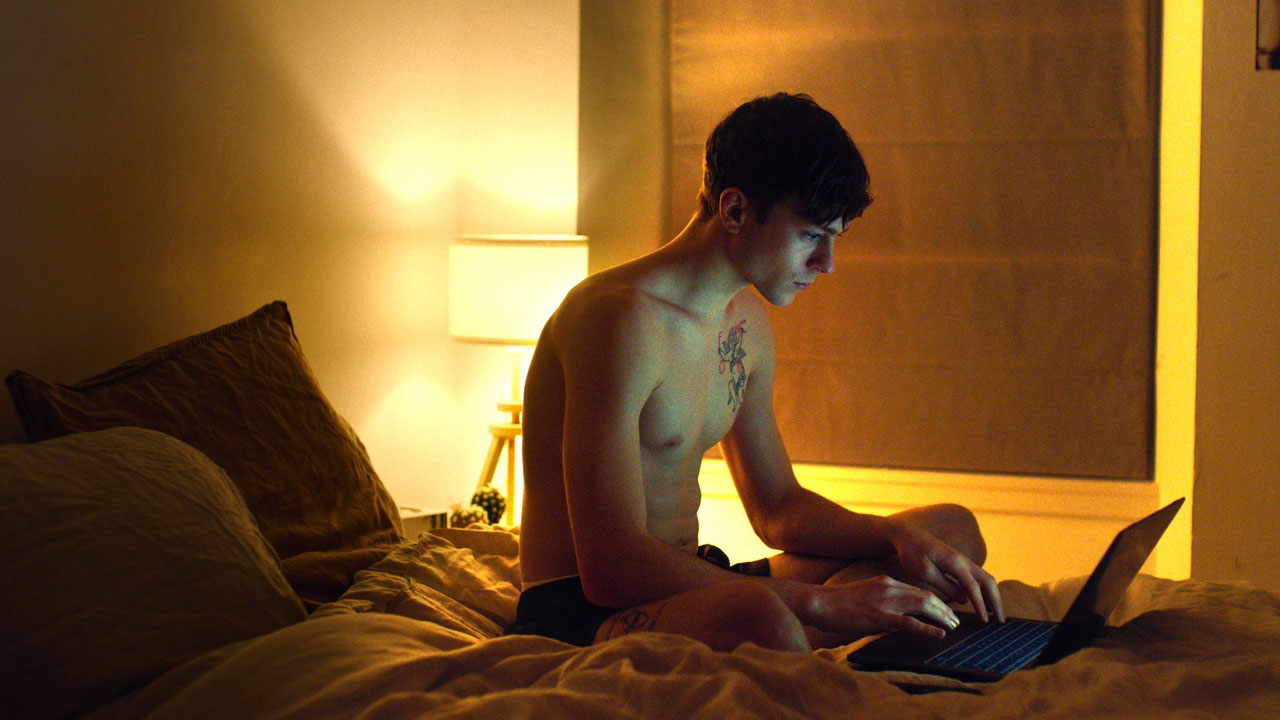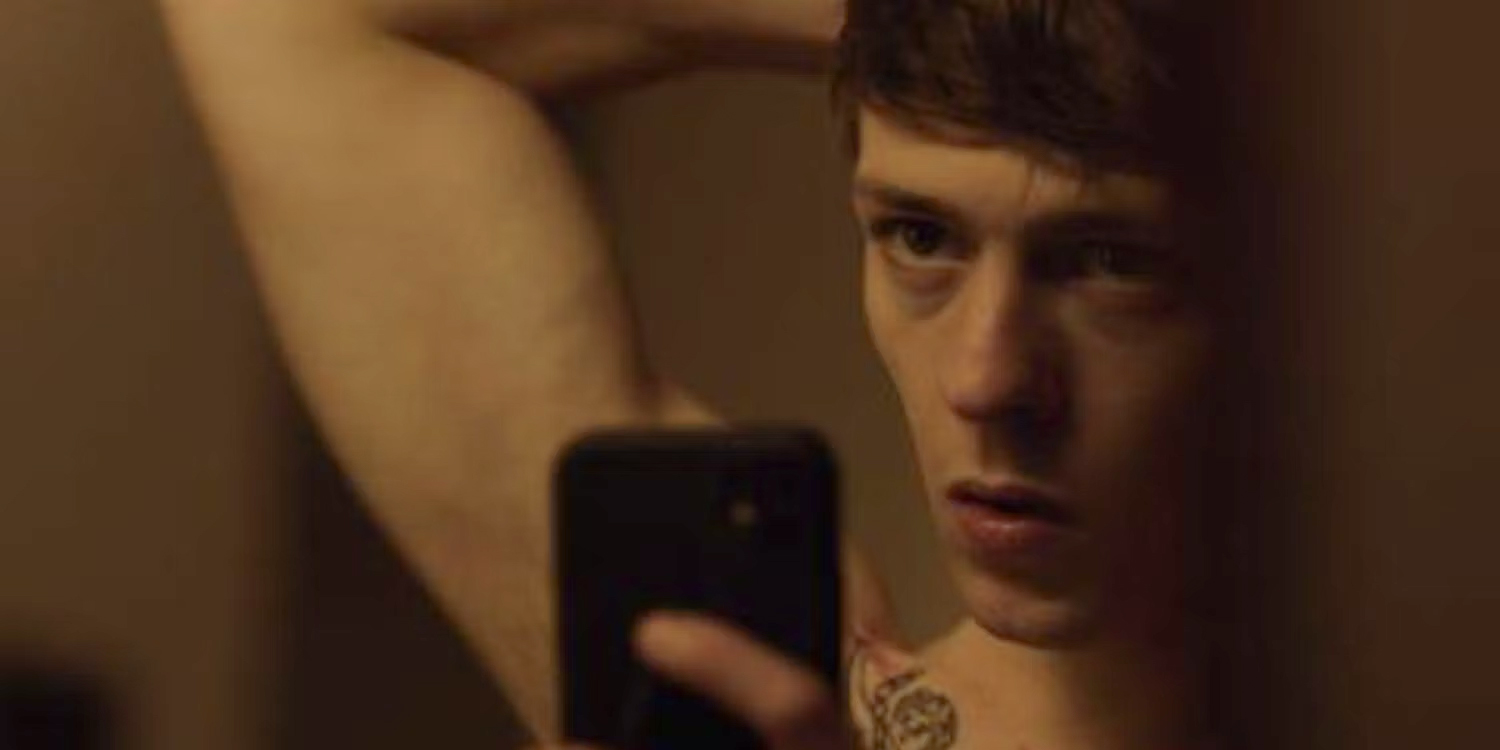
by Chris Carpenter
Take one of gay writer Bret Easton Ellis’ novels, a twist of Alfred Hitchcockian femme fatale/double life sensibility, European indie filmmaking realness, and a lot of male-on-male sex. Shake vigorously, pour, and you will end up with Sebastian, an engrossing new movie from the writer-director of 2018’s acclaimed gay romance, A Moment in the Reeds. It opens in US cities beginning Friday, August 2.
Former child actor Ruaridh (pronounced Rewery) Mollica is all grown up now and gives a riveting lead performance as Max, a 25-year-old aspiring novelist living in London. While paying his dues working at a literary magazine, Max grows frustrated by his own ambitions and the pressure to succeed. He begins moonlighting as a sex worker with the pseudonym Sebastian, secretly meeting men via an escort platform and using his experiences to fuel his stories.
What begins as a few furtive meetings soon becomes a hidden nocturnal life, and the debut novel that Max has been longing to write finally seems within reach. Finding himself more comfortable as Sebastian than expected yet determined to keep his exploits a secret, Max increasingly struggles to remain in control of a delicately balanced double-life. As he confronts conflicting feelings of ecstasy, shame and exhilarating liberation, Max has to reckon with whether Sebastian is merely a writer’s tool to achieve first-hand authenticity or whether something more is at stake.
Sebastian was written and directed by Mikko (pronounced Mee-ko) Mäkelä, a Finnish-British filmmaker based in London. IndieWire has named them as an LGBTQ Filmmaker on the Rise. Their micro-budget movie A Moment in the Reeds was screened at almost 100 festivals worldwide and nominated for Best Debut Feature at Frameline. Sebastian is Mäkelä’s second feature and had its world premiere at this year’s Sundance Film Festival in the World Cinema Dramatic Competition.
“So much of previous sex worker representation has focused on or implied the presence of trauma — either as a reason behind going into sex work or as an inevitable consequence — and this is something that I very much wanted to avoid,” Mäkelä wrote in the film’s press notes. “While the potential for exploitation in sex work is very real, this shouldn’t be taken to define the profession as a whole. The fact is that there are also plenty of happy, empowered sex workers who enjoy their work and are well-rewarded for it.”
As a teenager, Mollica appeared in the feature film Tell It to the Bees and as Young Stewart in the BBC’s Stonemouth. He began his professional acting career as a child alongside Jason Isaacs in Case Histories on the BBC. Mollica more recently played a lead role in the short film Too Rough, which received critical acclaim on the 2022 international festival circuit and won in the short film category at the BAFTA Scotland Awards and the British Independent Film Awards.
Writer-director Mäkelä reflected on the process of casting his lead actor: “From the start I knew that I wanted a relative unknown for the role. The film is a story of self-discovery – the most significant relationship in the film being that between Max and Sebastian – and I wanted the audience to be able to go on this same journey of discovering Max on screen, with no baggage of characters previously played. From my first viewing of Ruaridh’s tape, he jumped out at me with this intensity that clearly shone through. There is an audaciousness to Ruaridh that comes out at certain moments, combined with a control and precision that captures Max/Sebastian’s duality perfectly.”

THE RAGE MONTHLY INTERVIEWED VIA ZOOM BOTH THE FILMMAKER AND THEIR FRESH-FACED STAR ABOUT SEBASTIAN.
Thank you both for your time and congratulations on the film. It’s very surprising, very intelligent, very sensual, and watching it was a very good experience. Mikko, tell me how did this story or film come together for you?
The genesis or the beginning of it was I moved to London after university and was just starting to engage with the queer scene in the city. I started to realize how many young gay men were involved in sex work in some form or the other, especially facilitated by apps and the internet. It felt like the kind of threshold going into sex work was so much lower than maybe before, and a lot of people who you might not have expected doing sex work were doing it. This was even before Only Fans, so things were blowing up in a way and becoming so commonplace in a place like London.
So I was really curious about crafting a portrait of a character for whom sex work is a choice rather than something done for lack of (choices), which has so often been the case in depicting sex workers in the media. But then I wanted to combine that with an exploration of the nature of storytelling itself, especially in this moment when we place so much currency on authenticity of experience and whether writers or makers are writing about something that they have a level of experience about. I wanted to reflect on that question of who gets to tell whose story, and whether we have to have lived experience in order to write about something.
That’s interesting. Ruaridh, you make quite an impression in this film. How did the role or the project come your way?
Well, I got an email from my agent in October 2021 and I was just starting to commit myself to this acting career. I read the project description and the character description, and it was just so well written and thought out that I instantly wanted to read the script. Usually I wait a day or so to decide, but I picked the script up that night and finished the whole thing.
I was so unbelievably moved that (1) this story was being made, how incredible it was that this was actually happening and being funded, and (2) I just got completely excited at the opportunity that I could perhaps be considered to play the role of Max. I just fell in love with it.
Was there anything that concerned you about the project, seeing how kind of explicit it is?
Yeah, it was definitely intimidating. The whole project — the idea of the role and being in a film that is such a character study where you’re in almost every scene — is a daunting enough task as it is, but then the intimate scenes were really scary. I’d never done any intimate scenes before, I’d never worked with an intimacy coordinator before, so yeah it was scary. And knowing that once it comes out my body will just be out there, that was something that ultimately felt really good because it made me become more comfortable in my own skin.

You certainly have nothing to be embarrassed about in the final product. You look great! Mikko, I wanted to ask you about some of the literary influences on the film, especially Bret Easton Ellis. As a young adult in the late 1980s-early ‘90s, I was very familiar with his work (which includes American Psycho and Less than Zero). How did that become a source of inspiration for you?
I think he’s someone whose work has many parallels to Max’s work and to Sebastian in the sense of really kind of almost playing with the idea of fiction and autobiographical writing and asking “What’s fiction?” “What’s not?” You know, writing books with a protagonist named after himself that are clearly him, and then taking them to whole other places.
There is something about that playfulness and the way that he is deconstructing what a novel is, and the boundaries between autobiographical writing and novel writing, that really spoke to the concerns of this movie. He’s also always been known as a kind of provocateur, in a way that I’m sure Max would like to be viewed as well through his writings.
I was really happy to see veteran actor Jonathan Hyde (Jumanji, Titanic, TV’s The Crown and The Strain) in the film. I’ve long been a fan of his and I hadn’t seen him in anything in a while. Both of you, talk to me about casting him and working with him.
Mäkelä: I have to say that was a really difficult role to cast because it is such a crucial role, and the chemistry had to be right as well. Obviously, we had cast Ruaridh way before and (Hyde’s role) is also challenging for actors of his age group. There were people who would just take themselves out of consideration, so it was about finding someone who was brave enough to take on the role. But it was immediate to me once I saw Jonathan and Ruaridh together in their chemistry read that Jonathan was the right person for the role. It was such a pleasure to work with him.
Mollica: He just was amazing to work with. He never took himself seriously. He was always having fun. I think the most I learned from him as an actor was you can continue being useful and joyful your entire life. There’s no age boundary on that. You decide how young you feel. It was actually really moving. I almost looked at him and was like “you’re exactly who I want to be when I’m your age.” He was just so professional and made such bold choices but made them feel so truthful. I really loved working with him.
That’s awesome. Mikko, who are some of your influences as a filmmaker?
I really like French cinema and the more frank way in which French cinema approaches the body and depictions of sexuality. Francois Ozon is another one, a fantastic queer filmmaker who has made wonderful films about sexuality and also about creativity in the same way.
I’ve known that I wanted to be a filmmaker from a very early age, so the films that made me want to be a filmmaker probably had nothing to do with Sebastian. (laughs) Films like Star Wars and that sort of genre. But then it really evolved for me once I grew up and started to seek out queer cinema for representation, both as an escape and to try to connect to some kind of community through film. So then I shifted into thinking more about representation.
Great! I look forward to more good things from both of you in the future.
Chris Carpenter has been writing about entertainment since 1996 and a member of Team Rage since 2012. He is a founding member and vice president emeritus of GALECA: The Society of LGBTQ Entertainment Critics.